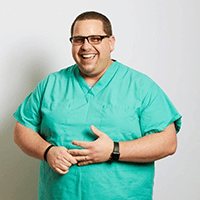Is Change the Cause of My Bad Attitude?

by Bruce Hoffman
I recently listened to a five-minute-ish Ted Talk given by Ric Elias on the “3 things I learned while my plane crashed”. If you haven’t had the pleasure of listening to it, just click the link and engage! I won’t spoil the storyline of his talk, but there were a few key points that I can easily recall; each one relevant to questions posed by this article – “Is Change the Cause of My Bad Attitude?” The question begs a necessary and timely discussion that could be had in any profession, but for the purposes of this one, we’ll apply it to the emergency medical and critical care service(s).
As aforementioned, there are three pearls that require dissection and application. Number one, change does not take as long as you think it does. Number two, stop wasting time on things that do not matter to those who matter. Number three, if you are happy, dying is not scary; it is sad. While you chew on those, let’s explore each a bit more…

Number one: change does not take as long as you think it does.
As if any of us in the pre-hospital world need to be reminded of this!? But do we? It is easy to apply this directly to our patients – their lives change in a split second. The mother of four who just picked her kids up from school, gets hit head-on by a texting teen on his way home from soccer practice…. One second, they are going about life; a second later, they become victims – alive or dead, they immediately join the ranks of those we, as providers, interact with most. The incident data surrounding their experience will support public service announcements, resource funding for continued prevention and intervention; and provide lessons to those that can still see and hear. My point is, things change really, really quickly.
So what is it about change that seems to take forever? Simply put, It’s how we deal with it, or maybe even our reaction to change. Our ability to cope with change is what defines our perception. In the paraphrased words of late Carnegie Mellon Professor, Randy Paucsh, “it’s not about the cards you’ve been dealt, it is how you play the hand!” Ditch the common sense thought that change takes a long time. Beat the negative by understanding the rapid-fire nature of change. It will make your life easier; guaranteed.

Number two: stop wasting time on things that do not matter to those who matter.
That pretty much sets the stage for number two: stop wasting time on things that do not matter to those who matter. Embracing the fact that change can change very fast, it would behoove each one of us to carefully consider how much time we spend belaboring something menial with a person that really matters to us! As Ric Elias would say, “I no longer try to be right, I try to be happy.” Contextually, I can only imagine him referring to how easily we are able to let things go. Harboring envy, jealousy, defensive correctness, or even spite can wreak havoc on our bodies – emotionally, physically, and psychologically. Let it go. Do not build an internal prison – it can take years to break out. The one caveat that I would offer is this – we have an obligation to those patients for whom we care. Employing strategies such as diplomatic candor and professional behavior can allow us to convey a point of correctness even when faced with the arch-nemesis of arrogant incorrectness.

Number three: if you are happy, dying is not scary; it is sad.
Number three: if you are happy, dying is not scary; it is sad. I interpret this both literally and figuratively. A happy life that is cut short is sad; very rarely, if ever, scary. Assuredly, happy folks tend to innately follow the two previously mentioned thoughts. By way of logic, it would only stand that they might embrace number three. Regardless, I offer this – happy people tend to live in the moment, constantly aware of how quickly life may change; thereby concentrating on the meaningful and impactful – with those who matter most. Sad would be how I would describe this kind of life if it were to end. I’m not sure that I know too many practitioners who would want to die in fear; scared of the very moment their life’s work clashes with whatever lies beyond the light. I might propose that if we, as providers and clinicians, subject our minds to these three nutritious nuggets – we may start to see a dramatic change in not only our attitude but also our life!
So, to answer the question “Is Change the Cause of My Bad Attitude?” – maybe, or maybe not, but now there are no excuses – get on the train; drink the juice; and CHANGE YOUR ATTITUDE! Be well, and stay safe out there!!

Bruce is a critical care registered nurse and paramedic who has worked in Connecticut, Massachusetts, and Maryland. His clinical background includes the ICU, ER, Trauma, Cardiology, and Flight. His graduate degree is in Education. After meeting her while working at the Johns Hopkins Hospital in Baltimore, MD, he is happily married to his wife, Stephanie. They currently live in Connecticut with their daughter Ava Mae and their 160 lb. English Mastiff, Maggie. In addition to being an active volunteer and officer with the Ellington Volunteer Ambulance Corps, Inc., Bruce enjoys professional gigs in clinical and distance medical education, advocacy, leadership, consultation, and blogging.
